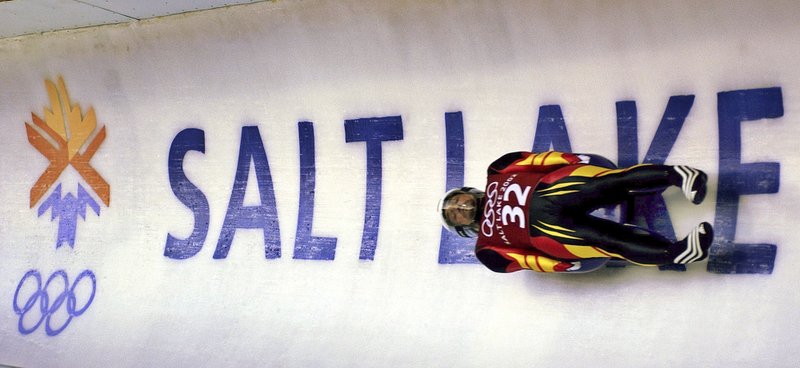
FILE – In this Feb. 9, 2002, file photo, Georg Hackl, of Germany, speeds past an Olympic logo during a practice run for the men’s singles luge at the 2002 Salt Lake City Winter Olympics in Park City, Utah. The idea of the U.S. hosting a Winter Olympics is complicated. So says the leader of the team that brought the Summer Games to Los Angeles for 2028. LA 2028 chairman Casey Wasserman says his team would be supportive of a bid to bring the Winter Games to the United States. (AP Photo/Elise Amendola, File)
PARK CITY, Utah — The venues are there. The city loves the Olympics. The memories of the last games it hosted are still fairly fresh and mostly positive.
This is the story of Los Angeles, which will host the Summer Games in 2028.
It’s also the story of Utah, which might get in the mix to host a Winter Olympics in 2026 or 2030.
The chairman of the LA bid was in Park City on Tuesday for the U.S. Olympic Committee media summit to discuss Los Angeles’ recent victory; many of the questions he fielded, though, involved whether a U.S. bid for an upcoming Winter Games might make sense, too.
“Twenty-six is complicated, obviously,” Casey Wasserman said. “Obviously, there are real challenges from a timing perspective, two years before us. But I think our approach has been, the Olympic Games, whether summer or winter, are good for American athletes. Our intent is to be a good partner to the USOC and American athletes.”
The USOC board will meet next month to discuss the possibility. The same country hasn’t hosted back-to-back Olympics since before World War II, though when the International Olympic Committee scrapped its traditional rules and awarded 2024 (Paris) and 2028 (LA) at the same time, it indicated it was certainly open to new ideas.
Salt Lake City hosted the Winter Olympics in 2002, and what remains there and in Park City pretty much adheres to Agenda 2020, the blueprint that IOC President Thomas Bach set for future Olympics, which calls for less spending on new venues and infrastructure.
Through a legacy foundation, the area has maintained an Olympic speedskating oval and a Nordic skiing course, each of which have drawn local athletes to their respective sports and could be used as part of an upcoming bid. The Utah Olympic Park remains an active training ground for action sports, for both U.S. athletes and those from other countries who are invited to work out there.
Meanwhile, Utah likes the Olympics: NBC says Salt Lake City has ranked as either No. 1 or 2 among U.S. TV markets over the last three Winter Games.
Leaders of the movement to bring the games back to Utah have largely stayed quiet, not wanting to take the limelight from Los Angeles, which helped the U.S. put a stop to a long string of embarrassing losses on the Olympic bid front. But a handful have told The Associated Press that there is enthusiasm for a potential bid if the USOC will sign on.
“There’s fantastic momentum to have the Games come back. I think we could do it for a very affordable price compared to the rest of the world,” said Ted Morris, the executive director of U.S. Speedskating, which is based in the Salt Lake City area. “In my opinion, looking at ’26 is probably not realistic, but ’30 seems like an opportunity.”
The most complicating factor for either year would be a reworking of an agreement between LA and the USOC that transfers the USOC’s marketing rights to the city’s organizing committee over an eight-year span. Adding another American Olympics to that mix would force some major renegotiations.
There’s also the issue of the IOC bid process. Bach has redrawn the rules for 2026, creating friendlier deadlines for cities to commit to a bid. But he has not committed to a potential double award for 2026 and 2030, the way he did with 2024 and 2028.
Also, the USOC will have to consider Denver and Reno, Nevada, which also have expressed interest in hosting a Winter Games but would be behind the curve compared with Salt Lake City.
“Thomas Bach has publicly stated he’d like to see the Winter Games return to a more traditional location, and to me, that’s code for Europe or North America,” said USOC chairman Larry Probst, speaking to the fact that the hosts for 2014, 2018 and 2022 are Russia, South Korea and China. “We’ve got to look at that, then develop a strategy about whether we’re going to bid for the (2026) Winter Games or beyond that.”

